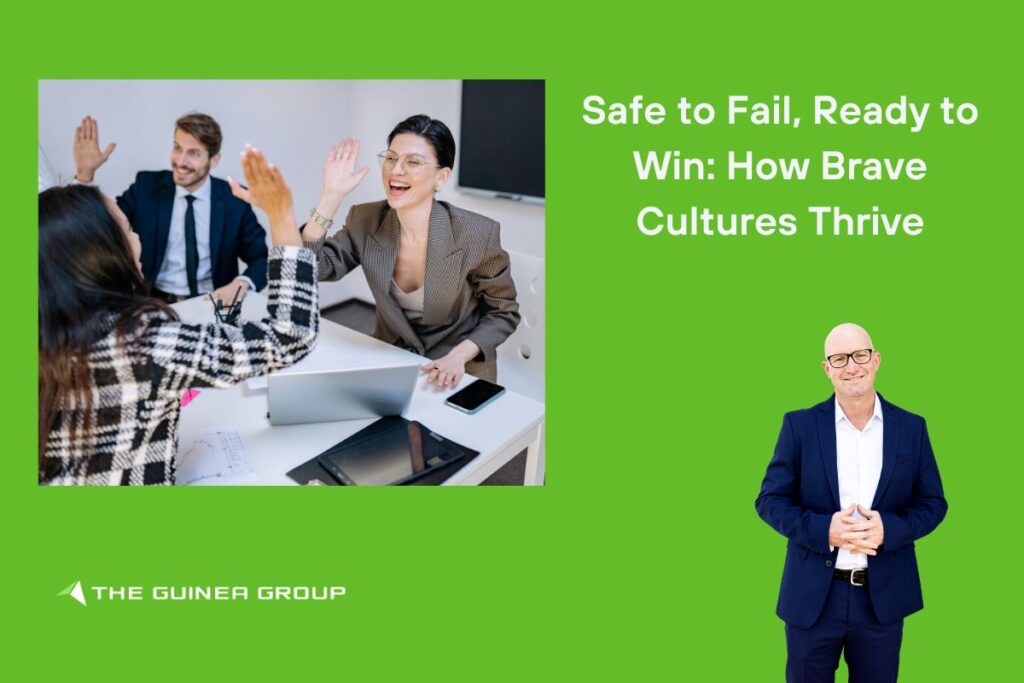Anton Guinea
Entrepreneur, Speaker, bestselling author, and founder of The Guinea Group of Companies. For over 15 years, Anton has helped leaders move their teams to become psychologically safe, physically safe and overall better versions of themselves.

Safe to Fail, Ready to Win: How Brave Cultures Thrive

What if your team felt safe enough to fail and confident enough to win?
I think about this question a lot. Most leaders I work with don’t realise how much fear holds their teams back. Not fear of speaking up necessarily but fear of messing up. Fear of looking silly. Fear of not having all the answers. And yet, the truth is, teams that fear failure never reach their full potential.
We’re in a strange place right now. Leaders are expected to push for performance, but also create safety. To be results-driven, but also emotionally aware. And let’s be honest, that can feel like walking a tightrope blindfolded.
But here’s the thing: if people don’t feel safe to fail, they’ll never feel ready to win. That’s the brutal tradeoff. Because every win is built on a hundred micro-failures. If we can’t normalise the small stuff going wrong, we’ll never create space for the big stuff to go right.
Brave cultures aren’t born, they’re built
I’ve seen leaders wait months, sometimes years, to have the hard conversations they should’ve had weeks into a new role. Why? Because they were afraid of “breaking trust”. But what actually eroded trust was the silence.
I’ve learned that brave cultures aren’t necessarily the loudest or most assertive. They’re the most psychologically safe. And safety doesn’t come from being nice, it comes from being clear.
For me, clarity used to mean giving better instructions. Now, I believe it’s about showing your team you care enough to be honest. To be real. Even if that means saying, “I don’t know. Let’s figure this out together.”
The best teams I’ve worked with are comfortable failing fast
There’s this idea floating around that high-performing teams always get it right. That they’re flawless. But scratch the surface, and what you really see is:
- Quick feedback loops
- More collaboration than competition
- Space to reflect before reacting
One article I keep going back to highlights that the top predictor of success isn’t talent or education. It’s psychological safety. Teams perform at their best when they don’t have to worry about being judged for trying.
In my experience, teams don’t lack creativity, they lack permission to share what they’re really thinking. And if you want that permission to stick, you need a dedicated safe speaking program that removes the fear factor.
We’ve got to stop treating mistakes like personal failings
Something I hear a lot during debriefs is, “I didn’t speak up because I didn’t want to get in trouble.” That’s heartbreaking. Nobody should feel like honesty at work is risky. If that’s the vibe, we’ve got a problem.
If you want to create trust that lasts beyond one good year, start building challenger safety. It gives people the confidence to question decisions or suggest better ways without being shut down.
And no, that doesn’t mean letting go of accountability. It means making it safe to learn and adjust. That’s how we build strong, resilient teams. Not by punishing risk, but by rewarding progress.
Not every failure is a red flag. Sometimes it’s the green light you needed
I’ve said in rooms before, “Failure isn’t the end, it’s the upgrade button most people are too afraid to press.” It sounds cheesy, but it’s real. Mistakes are signs. And the braver you are, the more you’ll learn from them.
There was a psychological study I came across that backed this up teams who were allowed to learn through experimentation had stronger outcomes and stayed more engaged over time.
And it’s not just research. Even anecdotal work, like this insight on psychological safety, reminds us that trust multiplies when failure is normalised. Not praised. Just accepted.
So… do your people feel safe to speak up when things go wrong?
If your answer is “I think so”, you might already be in the danger zone. Uncertainty is often a sign of silence. And silence doesn’t mean safety. It usually means fear.
Here’s what brave leadership actually looks like:
- Asking better questions instead of offering instant answers
- Rewarding feedback, not just results
- Creating space for people to reflect without being punished
Courageous leadership isn’t about being tough. It’s about making it safe to think, speak, and try. That’s when you see the shift. That’s when a good team becomes a great one.
If you’re ready to change the way your team works and speaks, book a session with me. Or if you’ve got a question about how this might apply in your workplace, reach out for a chat. No pressure. Just real talk.
Because you don’t need a perfect team. You need a brave one.
Please click the image below if you’d like to chat about what leadership means to you

If you would like to learn more about Anton or The Guinea Group, please click here to book into Anton’s calendar, to:
UPGRADE your Mindset
UPSKILL your Leadership
UPLIFT your Teams
About Anton
Anton has dedicated his working life to helping leaders to upgrade their mindset, upskill their leadership, and uplift their teams! With a focus on helps leaders to better lead under pressure. Anton is an entrepreneur, speaker, consultant, bestselling author and founder of The Guinea Group. Over the past 19 years, Anton has worked with over 175+ global organisations, he has inspired workplace leadership, safety, and cultural change. He’s achieved this by combining his corporate expertise, education (Bachelor of HR and Psychology), and infectious energy levels.
Work With Anton!
Subscribe to our Newsletter